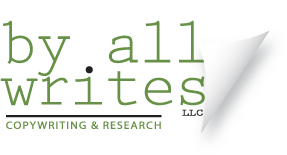
Of all the literary devices you can use to enhance your marketing copy, hyperbole is the sharpest, most double-edged machete. (See what I did just now?)
I threw a few literary-device curveballs at you in previous blog posts: alliteration, similes and metaphors, and so on. All are possibilities when attempting to add some oomph to your print or web content.
But there’s something about hyperbole that sends most scholarly types (teachers, professors, editors) into a frenzy. Most believe the only two solutions for hyperbole are either generous use of a red pen or your keyboard’s “Delete” key. But in my honest opinion, not all hyperbole is bad. (We’ll get to the word’s official definition in a lava-like hot minute.)
When used strategically, hyperbole can be an effective trigger. It can lure your readers and prospective customers/clients further into your spider’s web of services or products. Are you ready to become a disciplined believer in this most beleaguered of literary devices? Then “look into the eyes of the Dragon, and despair…”
First, Merriam-Webster’s Official Definition of Hyperbole: Here it is, respectfully summoned from the Oracle of Delphi. Per my Merriam-Webster’s Collegiate Dictionary (10th Edition): “extravagant exaggeration (as ‘mile-high ice-cream cones’).”
For something so extravagant (and exaggerated), this is quite the pithy explanation. The word hyperbole has both Latin and Greek origins (hyperbole = hyper [beyond] + bole [a throwing or casting]; to throw beyond). Let me elaborate (but not exaggerate) a bit…
The Overall Opinion of Hyperbole Is Not a Good One: When (most) academics or linguists hear the word hyperbole, what they’re really thinking is this: bad writing. Well, yes–hyperbole can be a very bad thing indeed.
Perhaps your extravagantly exaggerated words have been said or printed or circulated online so many times that they’ve become trite and meaningless. If so, overstatement may not be the right tool to use in your marketing content.
But let’s say you want to add some flair or humor to your message and make it more compelling. A dash of hyperbole can help your content stand out in an online (or offline) debris field.
It’s all in how your write your exaggeration. Are you prepared to go the distance? Would you walk 500 miles (and then walk 500 more) to craft creative hyperbole? Then prepare to wield this literary device carefully…
Here Is Hyperbole You Should Avoid: Let’s start with classically bad examples of hyperbole gone wrong. Many of the offending words and phrases are canonized in magazine and newspaper ads. And of course, many worn-out bits and pieces of hyperbole exist in everyday language. Do any of these sound familiar to you?
“I’ve asked you a thousand times not to…”
“I have a ton of homework to do.”
“I’m so hungry, I could eat a horse (or a Shetland pony, or a baby elephant, or…).”
“We had to wait forever for…”
“He’s as dumb as a doornail.” (Sometimes hyperbole and a simile or metaphor are blended together into one exaggerated comparison.)
“I can see for miles and miles…” (This is a great song by The Who, but it is hyperbole…)
From the glamorous world of advertising come these memorable examples of visual and verbal hyperbole:
“Guinness for Strength” (i.e., Irish Guinness Stout)
Those audacious Joe Isuzu (“The Liar”) ads from the 1980s (i.e., the Trooper sports utility had “more seats than the Astrodome” and could “carry a 2,000-pound cheeseburger.”)
Good Hyperbole Has Been Known to Grace Literature and Poetry: Many people believe hyperbole is better suited for poetry and fictional literature rather than advertising and marketing copy. I don’t fully agree with that sentiment. Regardless, here are examples of literary hyperbole that demonstrate how to write an extravagant exaggeration with verve:
“I was helpless. I did not know what in the world to do. I was quaking from head to foot, and could have hung my hat on my eyes, they stuck out so far.” (from Mark Twain’s Old Times on the Mississippi)
The poem “As I Walked Out One Evening” by W. H. Auden: “I’ll love you, dear, I’ll love you / Till China and Africa meet…” (Auden is one of my favorite poets. If you saw the movie Four Weddings and a Funeral, you’ve heard an Auden poem!)
“Well now, one winter it was so cold that all the geese flew backward and all the fish moved south and even the snow turned blue. Late at night, it got so frigid that all spoken words froze solid afore they could be heard. People had to wait until sunup to find out what folks were talking about the night before.” (from Paul Bunyan’s “tall tale” of Babe the Blue Ox)
I Don’t Advocate Using Clickbait Headlines for Your Online Content: We all know what this type of hyperbole looks like. We see it every day in headlines on sites like Buzzfeed, Flavorwire, and even my beloved Huffington Post. The term “clickbait” refers to headlines that sound too outrageous to be true. And yet, such headlines reel readers in, despite their bombastic claims.
For an insightful critique of clickbait headlines, please read this article by Belinda Weaver (aka The Copy Detective) of Copywrite Matters. Do you really need clickbait examples? Here are my parallel-universe versions of some of the typical offenders:
“If You Want Awesome Web-Traffic Conversion, NEVER Use This Call to Action Again!”
“The ONE Fatal Flaw in Your Marketing Plan That Will Sink Your Business Is…”
“This Is THE Never-Fail, Only Way to Close Your Next Sale!”
“This Mind-Blowing SEO Secret Has Google Seething with Envy…”
Back to the Content-Marketing Task at Hand: I think the key to successful use of hyperbole in your marketing copy is to spread it sparingly. Additionally, you should craft unconventional exaggerations–let your (implied) sense of humor shine through.
Allow these more tempered offerings to guide your hyperbolic instincts:
“Our cleaning solution doesn’t just remove set-in stains–it banishes them to a maximum-security prison.”
“These 2015 Marketing Trends Might Cause Global Thermonuclear War (But They Probably Won’t)”
“Because love shouldn’t hurt too much, you’ll only fall head over belt with our line of gourmet seasonings and spices.”
“At least one or two million of our fake-account acquaintances on Twitter recommend you attend our upcoming conference…”
Your moment of truth, gentle reader: Is use of hyperbole in marketing content and blog/article headlines a complete waste of time? Do you see any merit in using exaggeration (without lying) to entice people to click through or perform another action you’re trying to elicit?
Now that you’ve read my playful plea to give hyperbole a chance (all we are saying, is…), would you, could you, use it in your copy?
I’m not telling you to lie. Rather, I’m suggesting you experiment with hyperbole as a literary device. In other words, see if it’s something to include in your writing toolbox. And there you have it–the most incredible, incandescent, and unbelievably quench-thirsting blog post regarding hyperbole since sliced bread…
Lori Shapiro is the owner of By All Writes LLC, a business-to-business (B2B) writing, editing, and research company in Marlton, New Jersey. She revels in shielding her clients from the pain of writing their own print or web marketing and educational copy. Please call Lori Shapiro at 856-810-9764 or email By All Writes LLC at lori@byallwrites.biz for a no-obligation project quote today!








